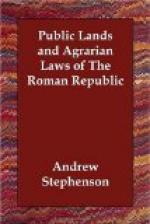1. A law “That the holders of the land which was the matter in dispute might legally sell[2] it.” Appian, who is the only authority for this period, does not give the date of the law nor the name of the tribune who proposed it, but Ihne[3] makes the date 118, and Mommsen assigns the law to Marcus[4] Drusus. This law was a repeal of all the restrictions which the Gracchi had placed upon assignments of public land. The object of this clause was to secure the success of their great reforms, and to establish a number of small proprietors who would cultivate their little farms, and breed citizens and soldiers. But forced cultivation is impossible, and sumptuary laws have never yet succeeded in increasing[5] population. Again it is inconsistent to give land to a man and deprive him of the power of sale, for this is an essential part of that domain which we call property in land. If a man wishes to sell, he will always have sufficient reasons for so doing, and a rich man can afford to pay[6] the highest price, freedom of exchange thus bringing ultimate good to both parties. It is easy to comprehend the consequences of this law. It was the commencement of a reaction entirely aristocratic in its nature.[7] It was skillfully conducted with the ordinary spirit of the Roman senate, the ruses, mental reservations, and dissimulations under guise of public interest. The aristocracy presented to the plebeian farmers, established by the lex Sempronia, a means of promptly and easily satisfying their passions. They had never earned their little farms, nor did they appreciate the independence of the tiller of the soil. Unaccustomed to farm labor,[8] and the plodding unexciting life of the Roman agricola, they made haste to abandon a toilsome husbandry, the results of which seemed to them slow and uncertain, and with the pieces of silver which they received as the price of their lands, returned to Rome to swell the idle and vicious throng[9] which enjoyed the sweet privilege of an existence sustained without labor.
Thus the nobles re-entered promptly and cheaply into the possession of the lands of which Tiberius had but a short time before deprived them, and, by means of a little sacrifice, substantially and legally converted their possessions into real property, while the plebeians whom Tiberius had wished to elevate by means of forcing[10] upon them the necessity of labor, fell back into their accustomed poverty and brutality. But the object for which the nobles were striving was not yet completely gained. The present victory was theirs; they now strove to guarantee the future, and so render impossible dangers similar to those already passed through.
2. A second law was thus enacted: “Spurius Borius, a tribune, proposed a law to this effect; that there should be no more distribution of the public land, but it should be left to the possessors who should pay certain charges (vectigalia) for it to the state ([Greek: daemo]) and that the money arising from these payments should be distributed."[11]




